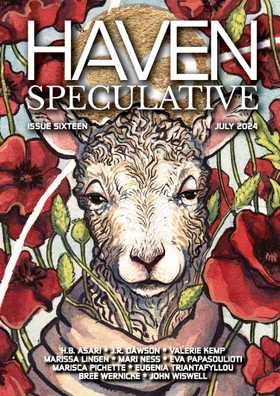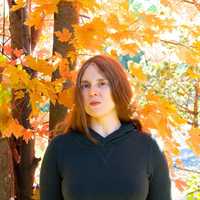FICTION
Conjured from the Rubble
by Marissa Lingen in Issue Sixteen, July 2024
After the quake, the air smelled like dust and blood and the ozone of lightning spells. The students were all on a mountain retreat with the chancellor, so there was no one to do the heavy work of cleaning up the university but the faculty and staff.
The quad had been hit hard. Most of the statues of glorious wizards of yore had sustained damage, including Head Wizard Barra's, which had plummeted from its pedestal, separating head from body. I didn't even understand where all the stones and debris had come from, but a lot of it would have to be removed through pure backbreaking labor.
Most of my fellow faculty were what my aunt would have described as "never did a hard day's work in their lives." She was wrong, of course, very wrong—a day of magic could be absolutely grueling—but a lot of the others didn't think of themselves as laborers. That was what students were for.
Turns out we weren't the only ones missing the students.
I didn't immediately notice the mob, brandishing makeshift weapons and trying to get in the main tower door. I should have backed quietly away, but I didn't understand yet. I thought they were looters.
"Hey, stop that!" I shouted.
They turned slowly, a few at a time.
"You can't go in there!" I continued.
They didn't swarm me and take me down. I think it didn't occur to them that there were more of them than there were of me because I was the wizard, automatically an imposing figure despite the dust in my hair.
"Where's my nephew?" said the woman at the head of the group.
I pushed my sweaty hair from my forehead and considered her uncomprehendingly. "How the blazes should I know?"
She turned to the woman next to her. "Doesn't even care what they've done to him," she said.
"Typical," the other woman agreed.
Typical of what, I could not say, but I made a try at clarifying all the same. "I don't even know who your nephew is."
"That's the way of them," the first woman went on, undaunted. "We're expendable to them. One as good as another. Cannon fodder."
"My dear neighbor—"
An angry shout went up from nearly every throat. "She ain't your neighbor!"
"We don't live in this neighborhood!"
"Wouldn't be caught dead!"
I tried again. "People." It sounded strange, but at least they weren't offended; the grumbling decreased to a dull mutter. "Our students were on a trip to the mountains when this happened. I'm sure they'll return when the roads are cleared. If you can leave your names with one of our staff—I'll do, I suppose—I can have them contact you when they return."
"A likely story," snorted a man who was brandishing what I was pretty sure was a boathook. I didn't usually worry about the exact taxonomy of blunt instruments when I had my trusty wand at my side.
My wand was not at my side.
My wand was in my classroom inside the tower, which had survived with minimal damage. I was luckier than most. I'd cleared as much as I could with spells before I needed to recharge my magic a little, but the work was too overwhelming to ignore. A bucket and a shovel would do when I was tapped out magically. There was no way to let myself in to get the wand without letting them in to get...everything else in the tower. Most of which they wouldn't know how to use. The last thing we needed after an earthquake was the kind of cataclysm that could come from the untrained smashing potions and charms together willy-nilly.
"Can we just," I started again, and apparently we could not just. Two of the larger men grabbed me by the shoulders and sat me down forcibly on the stones. At that moment, the crack in the big arch deepened. A chunk fell from it, narrowly missing a few stragglers. The crowd froze, staring at me. I closed my eyes and fervently hoped it was done for the moment.
" Now about our young ones. In the mountains, you said." The woman in the front had her own agenda for her neighbors and thus for me. "Where in the mountains."
"Wherever they can find supplies," I said, and this was again the wrong answer.
"Send 'em out without even supplies, to fend for themselves." She spat on the floor. It didn't hit my boot, but only just. "And my nephew Lozen so caught up in his books, what's he going to find for supplies. You didn't keep them here to die in the earthquake; you sent them out to die of exposure. Where they won't even do anybody any good with the cleanup."
It wasn't anything I hadn't worried about myself, though I hadn't let myself put it into words. And she was wrong about the supplies: what I meant was that they were gathering minerals and plants to bring back to use as supplies in their work here. But I couldn't blame her for worrying for her nephew, who was probably a lot like I was in my student days, out in the wilds. I worried for him myself, whichever one he was.
She sounded like someone's auntie, all right.
She sounded like my auntie.
I knew villagers. I knew how hard it was to get anything through their thick skulls. Especially anything magic. I was going to have to get to the door quickly and make my arguments from a position of strength. I feinted left in hopes that I could dodge right and win the day.
Instead, I got a sharp clout on the ear from a sturdy gran I hadn't even noticed. I knew better than to cry out—I'd grown up around enough old ladies like that—but it rang and ached and, more importantly, shook me up for a moment. When I could steady my voice, I asked, "What do you want from me?"
There was a brief silence.
"Well, what have you got?" asked Boathook in tones of purest reason.
In that moment, I was hard-pressed to answer him. I'd spent years earning my place at the university. I even had enough practical wizardry that I could start to make some headway against the chaos wrought by the earthquake. But in the face of tired, angry relatives, with no students to shove into their path? What had I got?
The scholars of wizardry are supposed to become one people, with one set of traditions. The night bell ringing the students' curfew, and an hour later the faculty's. Deep blue robes, jasmine tea and scallion pancakes by the fire. The same spells, the same stories: our shared glory.
But in the village I came from, we put fresh strawberries in a creamy pudding on the last night of spring, and I missed that pudding. And no matter how many real spells I learned, I never stopped doing the chant for fair stars on the first morning of summer. I had left the village where no one understood my love of magic, only to come to the university where no one understood my home.
I told no one. They were real scholars, enchanted with the scholarship of empires past and with newly developed spells and glamours. I was a ragged village child in disguise in my tidy blue robes. No matter how many honors I earned.
And these people would never see it. My disguise was too good. I'd come too far. And they didn't know the chant for fair stars. They had something else I wouldn't know. Eating fish for luck, maybe, or a song about bees. It could have been anything. I hadn't gone out into the neighborhoods to find out.
And now it was too late. Now they would know that I didn't know their ways—and they had no idea that they didn't know mine.
That's when I saw it: a bent but usable wand sticking out under the remnant of a statue's giant hand. It wasn't my wand, but I could make my way to it. But then what? Then I was the scary wizard again. The other side. The enemy.
There had to be a better way. And not just because I ached from my previous try.
"Look there," I said. "That's a wand." They could all see that it was within lunging distance for me, but I didn't lunge for it.
Auntie made a face at me. "So? What're we supposed to do with that? Think we're magicians like you?"
We do not like the term magician. It did not seem time to press the point.
"All of you have family members who have come here to study?" I asked. There was a jumble of answers—mostly yeses, but a few nos from people who followed along wherever their community leaders went—or, more charitably, wanted to support their friends and neighbors. I couldn't sort them all out. I tried again: "Everyone whose child—by birth or adoption, a child who lived with you when they were small—is here studying, raise your hand."
Auntie glared at me, probably afraid I was going to try to split the group. I wasn't. I was trying to get the whole group on my side.
"Did your child ever show you any of the magic they do?"
"Sure," said Boathook. "Tir couldn't get enough of the stuff. Finally let her go because I couldn't get any use out of her on the docks. But now's different, it's an emergency and—"
"And you need her at home," I finished for him. "I know. It's—it's awful to not be there when your family needs you. To not have your kid where you can look after them when something like this happens."
For the first time, the silence in the group facing me was not hostile. I wasn't out of this yet. But I was—we were—on the road to it.
"You can pick up that wand," I told Boathook. "Any of you can. You know a thing or two about it already, living with a young wizard as you have. I can show you one or two more things to do with it safely, as long as you're careful. As long as you treat it like—like a boathook. You wouldn't swing that thing around without looking where you were going, and there are things you'd never do with it. Wands are like that."
But Boathook was shaking his head, "Nah, nah, that's my girl Tir's work, not mine. I'm no magician. I just want a little help with the cleanup, that's all. A strong young back."
"Well, they'll return when they can. This is what I have in the meantime."
"How do I know it won't explode in my face?" asked Boathook. "How do I know you're not going to take me out that way?"
I should have thought of that. I blinked wearily at him. "First, I probably shouldn't tell you this, but my magic is too exhausted to 'take out' a mayfly. It's why I don't have my wand. And second, if I did that, all your neighbors would jump on me, and I'd be worse off than when I started."
He nodded reluctantly. Several of the others murmured agreement. But no one moved for a very long moment, and I was not at all sure where it would end.
I shouldn't have been surprised that it was Auntie who picked up the wand. I'd asked for parents in hopes that they'd figured out the rudiments of spells and conjuring from having a child do it in the house at inconvenient times, but courage trumped that level of knowledge any day. She said, "All right, which end do I point at the mess? If Our Lozen can manage it, it can't be too hard." The others were shaking their heads and muttering dubiously, but they let me cross the room to show her how to hold it, which end to point, what words to say.
And a bit of fallen stonework quietly collapsed into dust.
Auntie swore and the crowd roared with laughter and approval. And suddenly I was doing something I very much did know how to do: I was teaching beginners their first spells and trying to keep a bunch of giddy new wizards from creating chaos.
In this case, from creating more chaos.
They let me into the tower once I explained that I needed supplies just like any other craftsperson. I managed to get three of them comfortable with student wands and with two simple spells, dust and brief levitation, that I thought might help. I told them the signs of magic fatigue. It was a crash course, and I hoped none of them would crash too hard. And then I followed them home to make sure they didn't. Their mood was considerably lightened, laughing and joking with people they saw along the way about how Tigu and Auntie, whose real name was Zaffa, were going to become wizards now in their spare time.
We got enough of an opening made to get an old man out of his collapsing house, where he'd been trapped since the quake. We managed to sweep clean enough of a space in Zaffa's tavern that everyone taking breaks from clean-up shifts could rest there. It started to look like home again.
Just not my home.
But once they really realized that anyone really could do magic—once they saw me with a broom in my hand at Zaffa's—some of the joking and laughing was directed my way. It was easier to take than when I was a prickly fourteen-year-old. Felt less mean, more like I was part of the city I'd lived in since leaving home. When they were passing out small beer and chunks of mutton jerky, they passed some my way, and I took them. They put cloves in their small beer here. I never knew.
"What if I came down here a bit more? I could bring your young ones. Make sure they visit home for a Leafday meal now and then."
"We'd love to have you," said Zaffa."We'll stick a broom in your hand now that we know you can use it for something other than flying around. But we'd welcome your face, absolutely."
"What if I taught more classes? Little conjurings and hexes that could help you out around the place."
She made a face. "Neighbor, that's your road, not ours. Don't try to push your work off on us."
"Why not?" I dared. "You seem happy to do the same to me."
She laughed. But the others had the same answer: none of them wanted to learn any more than they had. They saw it as "becoming wizards." To me the difference was incalculably large. But I thought about it more over my clove-laden draught. I didn't want another mob like that again. And I could tell now that they didn't want to be one.
It was another three days before the student group came down from the mountains, grimy and thrilled, laden with minerals, plants, and stories of their own exploits. They had not lost a single person. I hadn't realized how worried I had been until the full count of them returned safely. I hadn't wanted to be the one to tell any of my new friends that their child was lost—but I didn't want to leave it to any of the other wizards either. Now I wouldn't have to.
"Lozen, Tir, Vrennen," I called out to them. The three named students snapped their heads around, shocked to be addressed by a professor they'd never met. Each of them gave a guilty little start that I recognized: someone has found me out; they know I'm not like the others. "Settle your things in your rooms and come find me. Your assignment for today is going to be a little different. And when you're done, come back to my offices." I'd managed to find the supplies to make strawberry cream pudding. It was a start.
© 2024 Marissa Lingen
Marissa Lingen
Marissa Lingen is a science fiction and fantasy writer and poet. She lives in Minnesota atop some of the oldest bedrock on the continent. She has an inordinate fondness for apples, tisanes, and Moomins.





